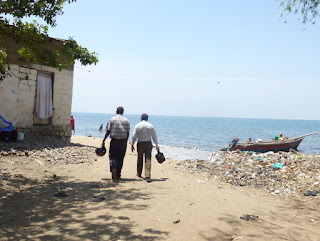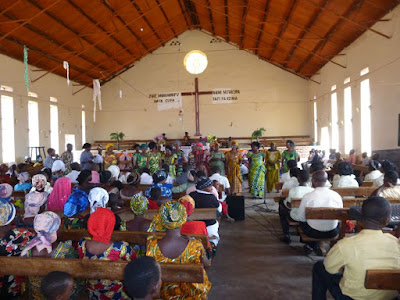In eastern Congo, the only published New Testament our group has seen so far is in the Fuliiru language. But several other New Testaments either are in press right now, or will be published in the next few years. Naturally, we want to know what kinds of factors affect whether or not people read them, so we can prepare as well as possible.
 |
| Ten thousand copies have been distributed; is their message being heard? Do people find the words 'sweet', or are the books only a curiosity? |
To get to the Fuliiru translation office in Kiliba, Bagamba and I traveled by air, sea, and land. On 20 August we flew to the town of Goma, on the northern shore of Lake Kivu. The next morning, we crossed the lake in a "rapid boat" (« canot rapide »).
Bukavu is on the southern shore. The photo below was taken from the window of a restaurant where we ate on our return trip.
In Bukavu we met the research team, pictured with us in Kiliba: Rév. Mbirize Masumbuko (Fuliiru Language Program Director); Feston and Malega, two other translators who have worked with him on the Fuliiru Bible now in draft; and six other Fuliiru pastors and Christian leaders. Mbirize is in the top left of the photo, Malega is next to me, and Feston is the only one in the "middle row".
 |
| The field researchers with Mbirize, Bagamba, Douglas and a guy in a football jersey. |
The best road from Bukavu to Kiliba passes through Rwanda. I hadn't ever thought that my first visit to Rwanda would last less than one hour -- much less my second visit, six days later! Bagamba and I rode in the front seat of the van in this photo. The white sign wishes us a good trip in English, French and Kinyarwanda.
After re-entering Congo, we dropped off pairs of researchers at various places on the way to Kiliba, arranging for them to meet us after five days of interviews in a total of about twenty villages. Madame Tulizo, whom you see here, is the widow of a pastor.
 |
| Saying 'see you later' to Mama Tulizo |
When walking with a camera, I often trailed behind Bagamba and Mbirize. On the left, we're going to the translation office shortly after our arrival in Kiliba. There were two cozy guest rooms, complete with solar power. On the right, Bagamba goes with Mbirize to see Lake Tanganyika up close.


|
But what did we find? More after the break...
Bagamba is always on the lookout for what language or languages children use among themselves. Sometimes Swahili, the trade language in this part of the DRC, is the only one he hears. That could mean that children are not learning the local language. In Kiliba, though, the children were using Fuliiru.
Of course, when children see a camera, they want to pose.
One afternoon, Rev. Mbirize interviewed pastors from a variety of church denominations in Kiliba. This pastor was on his way to a church meeting when we asked for a few minutes of his time. The zippered case in his right hand holds, yes, his Fuliiru New Testament.
Needless to say, Bagamba and I were invited to introduce ourselves during the Sunday morning church service.
But our remarks were virtually the only things in Swahili during a service that lasted well over three hours. Preaching, choral numbers, congregational singing, Scripture reading, exhortation, prayers, announcements -- all in Fuliiru.
 |
| Inside the Pentecostal church at Kiliba station |
Mbirize's colleague Kibambazi came to Kiliba from Uvira to greet us one day. Kibambazi is working on an African culture curriculum to be used every week of every year of primary school. Appropriately, Congolese law allows for this subject to be taught in the heritage language -- in this case, Fuliiru.
 |
| Mbirize, Douglas and Kibambazi |
We video-recorded this woman's testimony. She told us that for many years she went to church but continued to live a sinful life. The Bible readings and preaching were in Swahili and there was much that she didn't understand. Then the Fuliiru New Testament came, and she could clearly hear what God has to say to His people. Now she has victory over sin. Even though she can't read, she has learned what God's Word says in her language and puts it to use, admonishing others to follow Jesus.
Both of the men with Bagamba in the photo below told us interesting stories. The church served by the man on the left below had begun holding services in Fuliiru. Then their pastor was transferred and replaced by someone who didn't speak Fuliiru. The congregation petitioned the central office to someone who could lead the flock in their language. That is how this man became their pastor.
 | ||
| Two men with interesting stories |
This pastor said that using only the New Testament in Fuliiru is like trying to dance on one foot. There's an awkwardness in trying to integrate Old Testament passages into his sermons. He urged us to do all we can to hasten the completion of the whole Bible in Fuliiru.
 |
| Proof that Douglas was there too |
Walking along the road in the town of Uvira with Rev. Mbirize, we met this man. When Mbirize told him who we were, he had to tell us how much the New Testament in Fuliiru has blessed the church that he attends.
 |
| The word on the street is that the Fuliiru NT has had a powerful impact. |
We were in Uvira to meet the head of the Fuliiru Program Committee. They serve as a sort of 'board' for the language program, to offer encouragement and direction. He got out of his sickbed to meet us at the headquarters of the Pentecostal denomination that ordained Mbirize.

 |
| What is the meaning of the monument next to us in the last photo? Read to the end. |
 |
| PS. It was in that same neighborhood that I saw the symbol of United Methodism for the first time in the Congo -- almost 28 years after arriving in the country. |
Before leaving Kiliba, we debriefed with the four research teams. Talking with them reminded us of Luke 10:17. In spite of fatigue from working flat-out for five days under difficult conditions, every one of them told us of their joy in seeing the impact of the Fuliiru New Testament.
This research trip caused Bagamba and me some difficulties, too. The road was bumpy in places (and I mean that literally), and the food didn't always suit us. But the Lord took care of us and we can testify of his goodness and grace.
The first protestant missionaries in this area came from Sweden in the early 20th century. A number of that first generation of servants died even before completing their first term of service.
They were faithful witnesses who did not see the fulfillment of God's promise to raise up a community of people for himself in the Uvira Territory. We are blessed to have seen it.
"Therefore, since we are surrounded by a cloud of witnesses,
let us run with endurance the race before us." Hebrews 12:1.
let us run with endurance the race before us." Hebrews 12:1.
(The verse on the plaque: "Those who sow in tears will harvest with songs of joy." Psalm 126:5.}















This truly makes my heart sing. I salute you for taking this trip, and providing this testimony. To God be the glory.
ReplyDelete